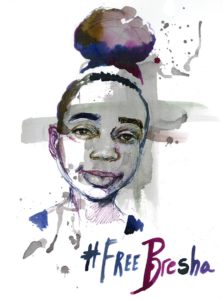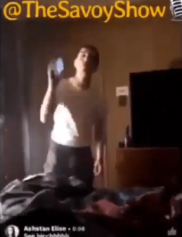
Art for Bresha Meadows by Molly Crabapple
After nearly a year of being dragged through the criminal justice system, it appears there might finally be some good news in the Bresha Meadows case. The 15-year-old was arrested and charged last year with the murder of her father, but her defense claims she was acting in self-defense after witnessing abuse toward her mother and being subjected to similar abuse for much of her life.
Bresha has been incarcerated in a juvenile detention center for the past nine months, but a preliminary plea deal, offered at her pre-trial hearing on May 8 may allow her to fulfill the the remainder of her 18-month sentence at a mental treatment facility and seal her criminal record as of her 18th birthday.
Bresha’s case has garnered worldwide support and highlighted how our justice system’s treatment of domestic violence victims causes Black women and girls to disproportionately suffer. Through this case and others like it, activists hope to enact systemic change that will allow for more compassionate rulings instead of further criminalizing victims.
Bresha’s family’s attempts to escape from her father’s violence have been well-documented. Her mother, Brandi Meadows, defended Bresha’s actions, saying in a statement that “In the 17 years of our marriage, he has cut me, broke my ribs, fingers, the blood vessels in my hand, my mouth, blackened my eyes. I believe my nose was broken.” Meadows filed a civil domestic violence protection order against her husband, Jonathan Meadows, in 2011, citing multiple instances where abuse was present in their relationship.
Prior to her father’s death, Bresha repeatedly ran away from home, claiming that her father habitually beat her mother, sometimes to the point of unconsciousness. Despite this history of abuse, Bresha has been detained since the incident and subjected to further victimization. Bresha’s lawyers have campaigned for her to be transferred to a mental health facility or put on house arrest, claiming that she suffers from post-traumatic stress disorder as a result of the violence witnessed in her home. During her incarceration Bresha has put been on suicide watch several times.
When looking at crime statistics and cases like Bresha’s, it quickly becomes apparent how our justice system habitually fails Black women and girls. A study in the Journal of Family Violence found that Black women experienced only a 54 percent decline in violence after filing protective orders against their abusers, compared to a 73 percent decline for whites and a 74 percent decline among Hispanic women. That same study also revealed that Black women are ten times more likely to report re-abuse compared to white women of comparable socioeconomic status.
Many times, reporting domestic violence can lead to mothers being investigated by child protective services. Until 2014, mothers in Chicago who reported domestic violence could be charged with neglect, and in many places across the country, women who report intimate partner violence face a domino effect of consequences, including eviction from housing under nuisance ordinances. A 2012 study from the American Sociological Association analyzed every nuisance citation in Milwaukee and found that Black households received a disproportionate amount of nuisance complaints and that nearly a third of all citations were generated by domestic violence. Last year, 29 senators wrote a letter to the Department of Housing and Urban Development, urging the department to investigate how local nuisance ordinances might violate the federal Fair Housing Act because of their disparate impact on women. A Milwaukee Domestic Violence Experiment study found that arresting abusers isn’t always the solution either, and for African-American victims, arrest increased mortality by 98 percent, compared to a 9 percent mortality increase among white victims.
There are countless examples of mothers who killed their abusers in self-defense hoping to save their children from abusive partners. The majority of those women are now in prison. A study conducted by the Michigan Women’s Justice & Clemency Project of all homicide convictions and sentences in Oakland County revealed shocking levels of discrimination against defendants who were victims of domestic violence. Black domestic violence victims were shown to be convicted at a higher rate (80 percent) and faced longer sentences than (62 percent) those charged with homicide, including those with previous criminal records. A California state prison study found that 93 percent of the women who had killed their significant others had been battered by them; 67 percent of those women indicated the homicide resulted from an attempt to protect themselves or their children.
Tewkunzi Green is one of those mothers. She was attacked by her ex-boyfriend Montral Fleming while holding their infant and when he began to strangle her, Tewkunzi grabbed what turned out to be a knife and stabbed him. Fleming died during surgery at a hospital. Tewkunzi defended her actions, saying she was afraid she would lose consciousness and drop her baby. She was sentenced to 34 years in prison in 2009.
Cases like Bresha Meadows’ and Tewkunzi Green’s make it clear that intervention techniques need to be changed in order to avoid further victimization. We need to create an environment where victims of intimate partner violence feel safe coming forward and will not fear being punished when they react in desperate situations. The race- and gender-based inequalities that exist within our current legal systems need to be amended to provide reasonable alternatives to prison so domestic survivors can heal from their abuse.
This is the mission of campaigns like #SurvivedandPunished. The project is organized by a coalition of anti-violence organizations and is committed to ending the criminalization of domestic and sexual violence victims. They support defense campaigns like Bresha’s and work with currently and formerly incarcerated survivors to develop policy research projects focused on decarceration. They’ve helped raise awareness of the #FreeBresha campaign and others like it.
Since she was arrested in late June of last year, Bresha has received widespread support with the #FreeBresha hashtag on social media and in April, activists held a #FreeBesha Week of Action, holding teach-ins to educate their communities about her case and the criminalization of domestic survivors. A rally was held at her pre-trial hearing on May 8 in an attempt to pressure the prosecutor into dropping charges.
Bresha will find out the specific terms of her plea deal at her next pre-trial hearing on May 22, but advocates are already demanding greater accountability. They argue that Bresha’s plea deal will not fix the systemic flaws that led to her imprisonment and want to see the justice system transformed to prevent similar cases in the future.
If nothing else, Bresha Meadows’ case has demonstrated the power of mass action and shows how we can begin to interrupt the normalization of violence against Black women and children. Our justice system is broken, and it’s especially rigged against Black communities. As we endeavor to fix it, communities must step up to protect women and children in vulnerable situations. Instead of asking why domestic survivors don’t seek help, perhaps we should ask ourselves why we didn’t offer.


